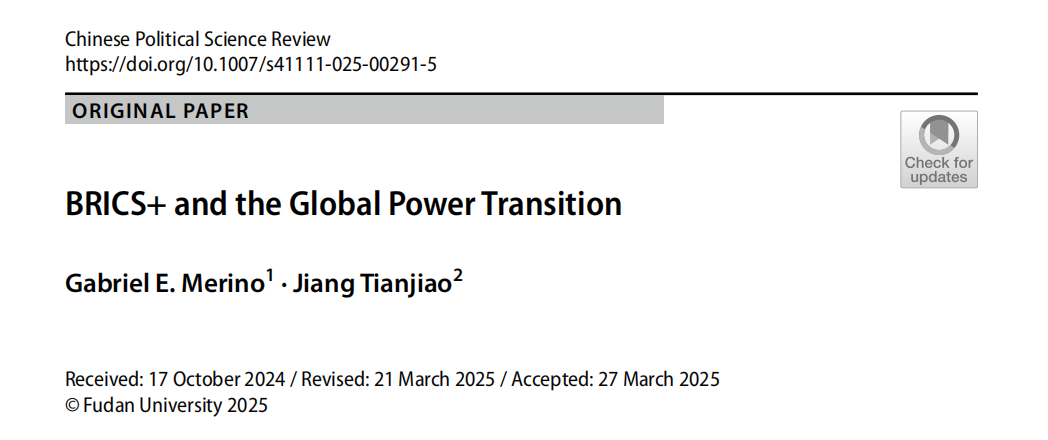作者:Gabriel Esteban Merino 江天骄 发布时间:2025-04-21 来源:Chinese Political Science Review+收藏本文

近日,由阿根廷拉普拉塔国立大学副教授、阿根廷国家科技研究委员会研究员、复旦发展研究院2024年访问学者Gabriel Esteban Merino与复旦发展研究院副教授、金砖国家研究中心副主任江天骄(通讯作者)合作完成的论文“BRICS+ and the Global Power Transition(金砖+”与全球权力转型)”发表于《Chinese Political Science Review》。中国政治科学评论(Chinese Political Science Review)是由复旦大学主办、Springer Nature出版的政治学学术刊物,2024年Cite Score分值为5.2,在政治学科类包括SSCI+ESCI的315本期刊在内的全部期刊中JCI排名Q1分区。
Abstract
本文探讨了金砖国家在世界体系地缘政治和历史空间转型中的“本质”和意义,重点关注2023年9月以来的金砖扩员。本文认为金砖国家代表了“半边缘国家”的崛起和政治上的“不屈”。这种态势反映出世界体系的深刻变革,即新的社会力量的出现并构成了一个新的“历史性团体”。此外,金砖国家扩员将这一进程扩展到全球南方的其他地区,具有重大的政治和地缘影响。比如中东和东南亚等关键地缘政治地区的权力再平衡、以西方为中心的资本主义世界体系中传统的中心-边缘结构出现危机、巩固欧亚大陆的大规模合作伙伴关系等。通过世界秩序民主化和鼓励替代性结构的出现,金砖国家正日益将自己定位为促进世界经济增长和改善全球治理的建设性力量。本研究旨在为正在进行的关于新兴国家和权力转型、全球秩序危机、“金砖+”对全球南方日益增强的引领以及未来多边主义面临的内部挑战和外部风险的辩论做出贡献。
This paper examines the “nature” and significance of BRICS within the geopolitical and historical-spatial transition of the world system, focusing on its enlargement since September 2023. The main argument is that BRICS represent the rise and political 'insubordination' of semi-periphery countries often referred to as developing nations-driven by middle and regional powers of continental scale operating within a global scenario. This dynamic is expressing a profound transformation of the world system and reflecting the emergence of new social forces that articulate anew 'historical bloc’. Also, the expansion of BRICS into BRICS+ extends this process to other regions of the Global South, with significant political and geopolitical implications. Some of these implications include: (1) a rebalancing of power in key geopolitical regions such as the Middle East and Southeast Asia; (2)a questioning and crisis of the traditional center-periphery dynamic (Global North-Global South) within the capitalist world system centered in the West; and (3)the consolidation of large-scale cooperative partnerships across Eurasia. By democratizing the world order and encouraging the emergence of alternative structures, BRICS is increasingly positioning itself as a constructive force for promoting world economic growth and improving global governance. This study has the purpose to contribute to the ongoing debates on power transition and emerging powers, the crisis of global order, the increasing relevance of BRICS+ within the Global South, and the internal challenges and external risks facing this multilateral space in an emerging world.
Key Words
BRICS+, Global south, Center-periphery, Geopolitics, Multipolarity, Cooperation
Link for Full Paper
https://link.springer.com/article/10.1007/s41111-025-00291-5
Authors
Gabriel E. Merino
Department of Geography / Institute for Research in Humanities and Social Sciences(IdlHCS), National Council for Scientific and Technical Research (CONICET). Co-coordinator of the CLACSO working group “China and the map of world power”. Director of the Research and Development project: “Historical-spatial transition of the world system and Latin America”, based at CIGIdIHCS-UNLP. Coordinator of the Eurasian Department of Institute of International Relations (UNLP).
Jiang Tianjiao
Associate professor of Development Institute, Fudan University. Associate Director of Center for BRICS Studies, Fudan University (Corresponding Author)